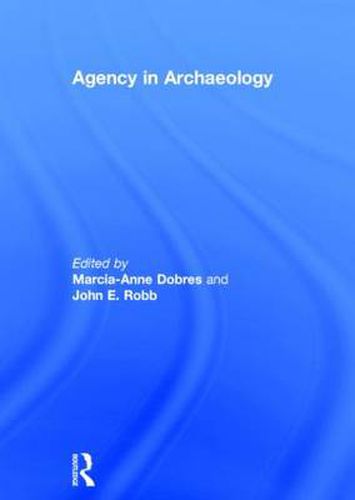Readings Newsletter
Become a Readings Member to make your shopping experience even easier.
Sign in or sign up for free!
You’re not far away from qualifying for FREE standard shipping within Australia
You’ve qualified for FREE standard shipping within Australia
The cart is loading…






Agency in Archaeology is the first critical volume to scrutinise the concept of human agency and to examine in-depth its potential to inform our understanding of the past. Theories of agency recognise that humans make choices, hold intentions, and take actions. Their use offers archaeologists the means to move beyond broad structural or environmental explanations of culture change and instead to consider the individual and the group. As such, the concept of agency has gained influence in every variety of archaeology, from post-processualism to evolutionary ecology. However, there has been little consensus among archaeologists on what agency actually means, and how specifically it can be used in studying the pre-modern past. Agency in Archaeology brings together nineteen internationally renowned scholars who have very different, and often conflicting, stances on the meaning and use of agency theory to archaeology. The volume is composed of five theoretically-based discussions and nine case studies, drawing on regions from North America and Mesoamerica to Western and central Europe, and ranging in subject from the late Pleistocene hunter-gatherers to the restructuring of gender relations in the north-eastern US. Elizabeth Brumfiel, Albion College, USA, John Barrett, University of Sheffield, UK, John Chapman, University of Durham, UK, John E. Clark, Brigham Young University, USA, I
$9.00 standard shipping within Australia
FREE standard shipping within Australia for orders over $100.00
Express & International shipping calculated at checkout
Agency in Archaeology is the first critical volume to scrutinise the concept of human agency and to examine in-depth its potential to inform our understanding of the past. Theories of agency recognise that humans make choices, hold intentions, and take actions. Their use offers archaeologists the means to move beyond broad structural or environmental explanations of culture change and instead to consider the individual and the group. As such, the concept of agency has gained influence in every variety of archaeology, from post-processualism to evolutionary ecology. However, there has been little consensus among archaeologists on what agency actually means, and how specifically it can be used in studying the pre-modern past. Agency in Archaeology brings together nineteen internationally renowned scholars who have very different, and often conflicting, stances on the meaning and use of agency theory to archaeology. The volume is composed of five theoretically-based discussions and nine case studies, drawing on regions from North America and Mesoamerica to Western and central Europe, and ranging in subject from the late Pleistocene hunter-gatherers to the restructuring of gender relations in the north-eastern US. Elizabeth Brumfiel, Albion College, USA, John Barrett, University of Sheffield, UK, John Chapman, University of Durham, UK, John E. Clark, Brigham Young University, USA, I